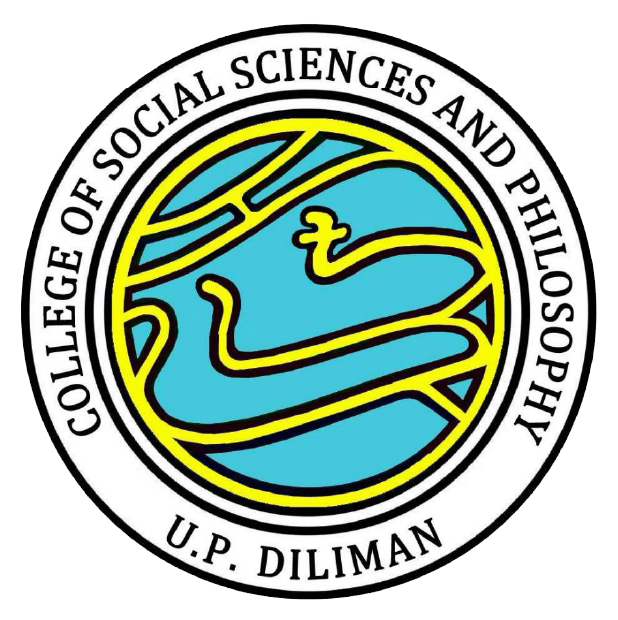Publications
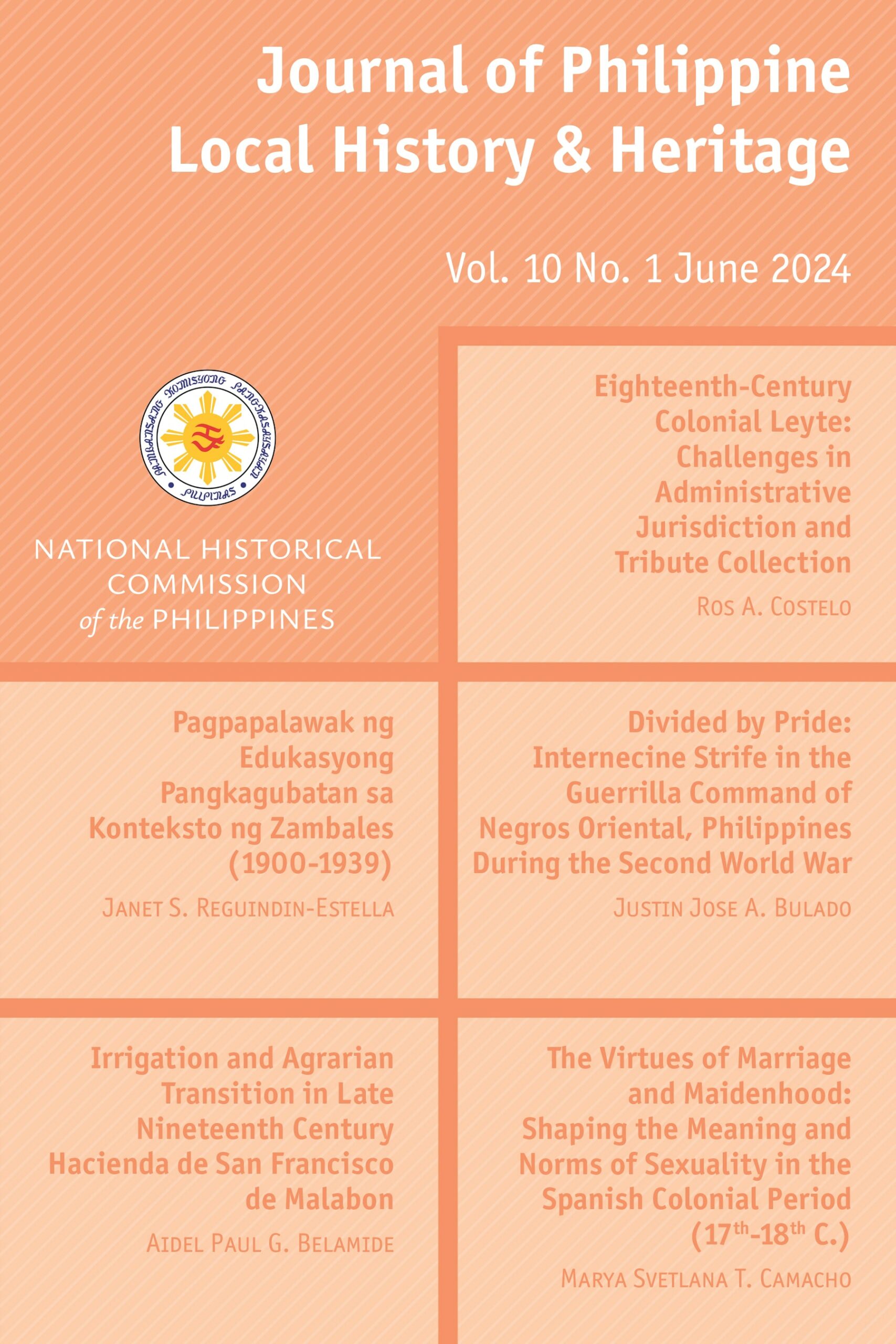
Eighteenth-Century Colonial Leyte: Challenges in Administrative Jurisdiction and Tribute Collection
Prior to 1746, Samar and Leyte, along with the smaller islands of Biliran and Maripipi, were governed as a single political entity. However, in 1747, Samar and Leyte were officially separated into two distinct provinces, each with its own capital and provincial governor (alcalde mayor). However, just six years later, in 1753, authorities decided to revoke the partition. Throughout the latter half of the eighteenth century, the decisions made by the authorities, both in the Philippines and Spain, regarding the division or reunification of the two islands were continuously influenced by an interplay of political, economic, and religious forces.
This paper delves into the political and social history of Leyte during the latter half of the eighteenth century. It is structured into two primary sections. The first part explores the origins of Leyte and Samar as separate provinces in the mid-1700s and sheds light on the reasons behind the fluctuating territorial status of these islands until their final division at the end of the century. The second part documents the resistance of the local population to tribute payments in Leyte during the mid-century, a problem perceived by colonial authorities as stemming from the administrative reconfiguration. The colonial government viewed this unrest as a compelling reason to revert to the previous administrative arrangement for Leyte and Samar as one political jurisdiction. Drawing upon underutilized archival sources from the Archivo General de Indias (AGI), this paper aims to enrich the understanding of Leyte´s local history by utilizing eighteenth-century primary sources. Particularly noteworthy are the previously unused archival documents written in the local language, Bisaya Samar-Leyte/Waray.
This paper delves into the political and social history of Leyte during the latter half of the eighteenth century. It is structured into two primary sections. The first part explores the origins of Leyte and Samar as separate provinces in the mid-1700s and sheds light on the reasons behind the fluctuating territorial status of these islands until their final division at the end of the century. The second part documents the resistance of the local population to tribute payments in Leyte during the mid-century, a problem perceived by colonial authorities as stemming from the administrative reconfiguration. The colonial government viewed this unrest as a compelling reason to revert to the previous administrative arrangement for Leyte and Samar as one political jurisdiction. Drawing upon underutilized archival sources from the Archivo General de Indias (AGI), this paper aims to enrich the understanding of Leyte´s local history by utilizing eighteenth-century primary sources. Particularly noteworthy are the previously unused archival documents written in the local language, Bisaya Samar-Leyte/Waray.
Leyte
eighteenth-century Leyte
colonial administrative jurisdiction
tribute
indigenous resistance
division of province
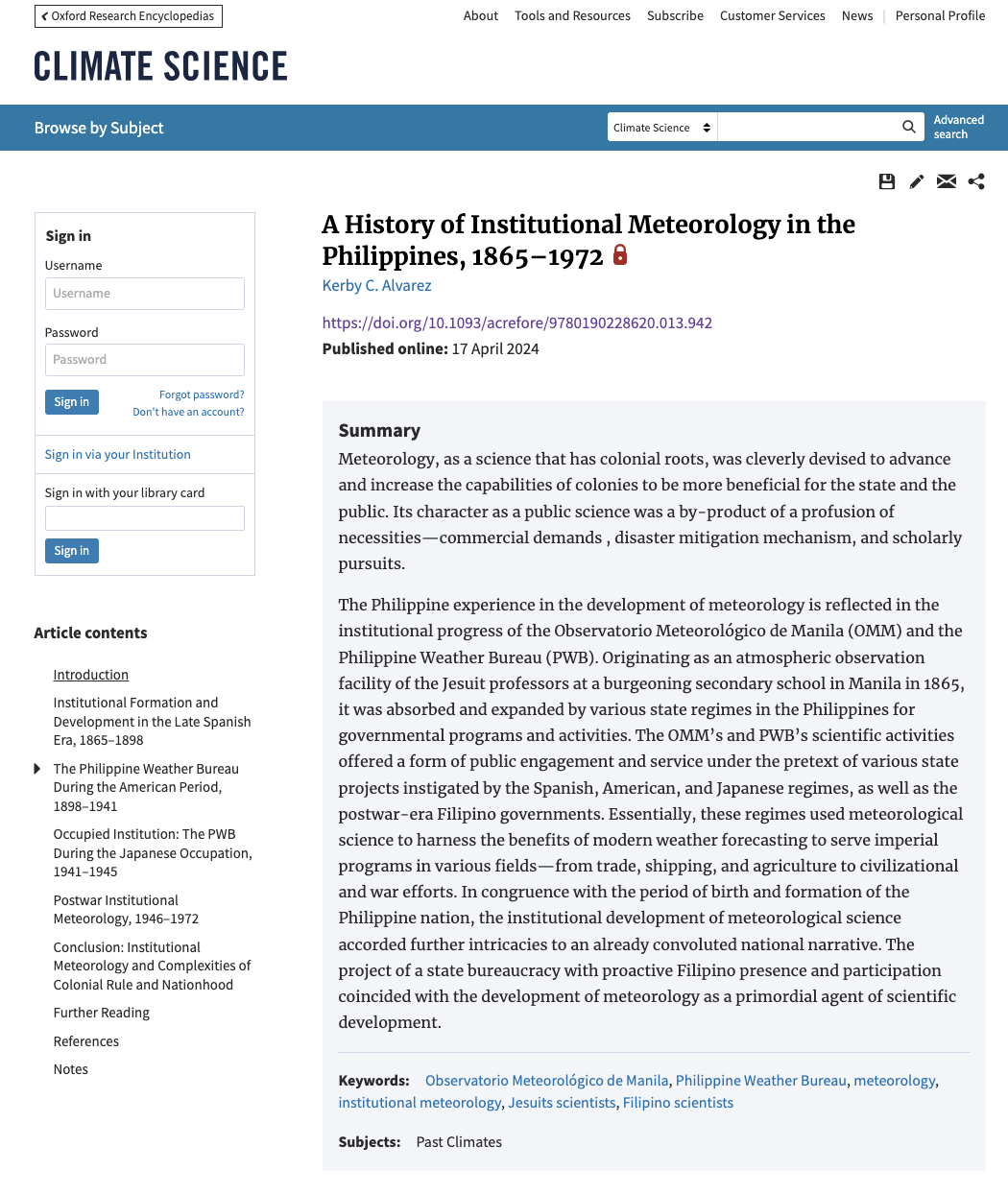
A History of Institutional Meteorology in the Philippines, 1865-1972
Meteorology, as a science that has colonial roots, was cleverly devised to advance and increase the capabilities of colonies to be more beneficial for the state and the public. Its character as a public science was a by-product of a profusion of necessities—commercial demands, disaster mitigation mechanism, and scholarly pursuits.
The Philippine experience in the development of meteorology is reflected in the institutional progress of the Observatorio Meteorológico de Manila (OMM) and the Philippine Weather Bureau (PWB). Originating as an atmospheric observation facility of the Jesuit professors at a burgeoning secondary school in Manila in 1865, it was absorbed and expanded by various state regimes in the Philippines for governmental programs and activities. The OMM’s and PWB’s scientific activities offered a form of public engagement and service under the pretext of various state projects instigated by the Spanish, American, and Japanese regimes, as well as the postwar-era Filipino governments. Essentially, these regimes used meteorological science to harness the benefits of modern weather forecasting to serve imperial programs in various fields—from trade, shipping, and agriculture to civilizational and war efforts. In congruence with the period of birth and formation of the Philippine nation, the institutional development of meteorological science accorded further intricacies to an already convoluted national narrative. The project of a state bureaucracy with proactive Filipino presence and participation coincided with the development of meteorology as a primordial agent of scientific development.
The Philippine experience in the development of meteorology is reflected in the institutional progress of the Observatorio Meteorológico de Manila (OMM) and the Philippine Weather Bureau (PWB). Originating as an atmospheric observation facility of the Jesuit professors at a burgeoning secondary school in Manila in 1865, it was absorbed and expanded by various state regimes in the Philippines for governmental programs and activities. The OMM’s and PWB’s scientific activities offered a form of public engagement and service under the pretext of various state projects instigated by the Spanish, American, and Japanese regimes, as well as the postwar-era Filipino governments. Essentially, these regimes used meteorological science to harness the benefits of modern weather forecasting to serve imperial programs in various fields—from trade, shipping, and agriculture to civilizational and war efforts. In congruence with the period of birth and formation of the Philippine nation, the institutional development of meteorological science accorded further intricacies to an already convoluted national narrative. The project of a state bureaucracy with proactive Filipino presence and participation coincided with the development of meteorology as a primordial agent of scientific development.
Observatorio Meteorológico de Manila
Philippine Weather Bureau
meteorology
institutional meteorology
Jesuit scientists
Filipino scientists

Revisiting Alzona: Internationalism in Philippine National Education (1917–1961)
One of the enduring hallmarks of American colonial rule in the Philippines was the establishment of a public school system criticized by scholars over the years for having been a tool to subjugate the minds of Filipinos by neglecting local knowledge and culture as well as repressing most forms of nationalism. This “miseducation” of the Filipino people is often argued to have continued long after Philippine independence in 1946.
However, efforts of Filipinos to shape a national identity that was independent of American policy were present during the colonial era, even among those who worked within the colonial bureaucracy. A culturalist form of nationalism characterized the efforts of elite Filipino intellectuals to mold the identity of an infant nation under the so-called “tutelage” of America. It is a form of nationalism often absent in the common reductivist view of American-trained Filipino intellectuals as miseducators of their countrymen. The recent identification of this form of nationalist heralds a need to revisit the works of Filipino nationalists in the 1930s, reading them with fresh eyes and thereby discovering new ways of appreciating their contributions to the history of Philippine national thought.
One such intellectual was Dr. Encarnacion Alzona. This study revisits her writings on Filipino education and culture from the 1910s to the 1960s, examining her contributions to Philippine nationalism under a lens of nationalist internationalism. A reading of her doctoral dissertation, published articles, and public speeches reveals that Dr. Alzona’s educational philosophy does not easily fit within the neat boundaries of yesteryear’s nationalist historiography. Her understanding of the relationship between nationalism and education—as well as their role in the formation of new generations of Filipino citizens—consistently portray the need to appreciate the perspectives of other nations to locate Philippine history within the broader history of mankind. This situates her in a more nuanced position outside the easy binary categorization of being either pro- or anti-American imperialism.
However, efforts of Filipinos to shape a national identity that was independent of American policy were present during the colonial era, even among those who worked within the colonial bureaucracy. A culturalist form of nationalism characterized the efforts of elite Filipino intellectuals to mold the identity of an infant nation under the so-called “tutelage” of America. It is a form of nationalism often absent in the common reductivist view of American-trained Filipino intellectuals as miseducators of their countrymen. The recent identification of this form of nationalist heralds a need to revisit the works of Filipino nationalists in the 1930s, reading them with fresh eyes and thereby discovering new ways of appreciating their contributions to the history of Philippine national thought.
One such intellectual was Dr. Encarnacion Alzona. This study revisits her writings on Filipino education and culture from the 1910s to the 1960s, examining her contributions to Philippine nationalism under a lens of nationalist internationalism. A reading of her doctoral dissertation, published articles, and public speeches reveals that Dr. Alzona’s educational philosophy does not easily fit within the neat boundaries of yesteryear’s nationalist historiography. Her understanding of the relationship between nationalism and education—as well as their role in the formation of new generations of Filipino citizens—consistently portray the need to appreciate the perspectives of other nations to locate Philippine history within the broader history of mankind. This situates her in a more nuanced position outside the easy binary categorization of being either pro- or anti-American imperialism.
Encarnacion Alzona
Education
Nationalism
Internationalism

Si Dante L. Ambrosio at ang Kasaysayan ng Etnoastronomiyang Pilipino, 1992–2010 (Dante L. Ambrosio and the History of Philippine Ethnoastronomy, 1992–2010)
Tinatalunton sa papel na ito ang interes at ambag ng historyador na si Dante L. Ambrosio (1951–2011) sa pagsasakasaysayan ng etnoastronomiyang Pilipino. Binansagang “ama ng etnoastronomiyang Pilipino,” napatanyag si Ambrosio dulot ng kaniyang mga pananaliksik, na primaryang kinakatawan ng kaniyang aklat na Balatik: Etnoastronomiya: Kalangitan sa Kabihasnang Pilipino (2010). Inilahad niya rito ang kabang-yaman ng mga pananaw, paniniwala, kaalaman, at kaugalian ng mga katutubong Pilipino hinggil sa kalangitan, na kinakasangkapan din para sa mga gawaing pangkabuhayan at pangkalinangan. Isinasalaysay sa papel na ito ang henesis ng kaniyang interes sa astronomiya mula 1965 matapos niyang masaksihan ang pagdaan ng Kometa Ikeya-Seki, hanggang sa kaniyang pag-alam sa mga katutubong bituin noong 1982 bilang mag-aaral ng kasaysayan sa Unibersidad ng Pilipinas, hanggang sa panimulang pananaliksik tungkol sa etnoastronomiya mula 1992 bilang bahagi ng programang doktorado, pagsasagawa ng fieldwork sa Tawi-Tawi noong 1995–2000, at pagsulat ng kaniyang disertasyon na pinamagatang “Balatik: Kalangitan bilang isang Saligan ng Kabihasnang Pilipino, 1582–Kasalukuyan” (2003).
Iginigiit din sa papel na ito na bagaman may malaking pagkakaiba ang paksa niya para sa tesis masterado, na tungkol sa militanteng kilusang pangmanggagawa, sa paksa niya sa disertasyon, may masisilayan tayong pagpapatuloy at pagsasalikop ng dulog at ideya sa dalawang pag-aaral—lalo na ang isinusulong niyang historiograpikong konsepto ng “kapaligiran.”
Iginigiit din sa papel na ito na bagaman may malaking pagkakaiba ang paksa niya para sa tesis masterado, na tungkol sa militanteng kilusang pangmanggagawa, sa paksa niya sa disertasyon, may masisilayan tayong pagpapatuloy at pagsasalikop ng dulog at ideya sa dalawang pag-aaral—lalo na ang isinusulong niyang historiograpikong konsepto ng “kapaligiran.”
Dante L. Ambrosio
etnoastronomiya
balatik
kilusang manggagawa
kapaligiran

Pagsasakasaysayan ng Klima, Kalangitan, at Kalamidad: Historyograpikong Sarbey sa mga Akdang Siyentipiko at Historikal ni Miguel P. Selga, 1920s–1972
Ang mga siyentista sa Pilipinas noong ika-20 dantaon ay malaki ang ginampanang papel sa magkatambal na usapin ng produksiyon ng kaalaman at pagbubuo ng bansa. Ang mga siyentistang ito, na bahagi ng mga institusyong akademiko at ahensiyang pang-agham ng bansa, ay nagsulong ng porma ng pananaliksik at pagbubuo ng mga larangan ng kaalaman tungo sa pagbubuo ng intelektuwal na pundasyon ng pagkabansa.
Ilalahad ng papel na ito ang isang historyograpikong pagsusuri sa mga akdang siyentipiko at historikal ni Padre Miguel Selga mula 1920s hanggang 1972, lalo na sa panahong siya ang direktor ng Philippine Weather Bureau (PWB) mula 1926 hanggang 1945. Titingnan ang produksiyon ng kaalaman tungkol sa kapaligiran, klima, at mga penomenong meteorolohiko, sismolohiko, at astronomiko, gayundin ang kanyang ambag sa larangang historikal. Sa pagsusuring ito, makikita ang isang takbo ng historyograpiyang nakatuon sa kalagayan at prosesong pangkapaligiran, na mahalaga sa pagpapalawak ng unawa sa ebolusyon ng lipunan at pagpapayaman sa historiograpiyang Pilipino.
Ilalahad ng papel na ito ang isang historyograpikong pagsusuri sa mga akdang siyentipiko at historikal ni Padre Miguel Selga mula 1920s hanggang 1972, lalo na sa panahong siya ang direktor ng Philippine Weather Bureau (PWB) mula 1926 hanggang 1945. Titingnan ang produksiyon ng kaalaman tungkol sa kapaligiran, klima, at mga penomenong meteorolohiko, sismolohiko, at astronomiko, gayundin ang kanyang ambag sa larangang historikal. Sa pagsusuring ito, makikita ang isang takbo ng historyograpiyang nakatuon sa kalagayan at prosesong pangkapaligiran, na mahalaga sa pagpapalawak ng unawa sa ebolusyon ng lipunan at pagpapayaman sa historiograpiyang Pilipino.
Miguel Selga
meteorolohiya
seismolohiya
astronomiya
Philippine Weather Bureau
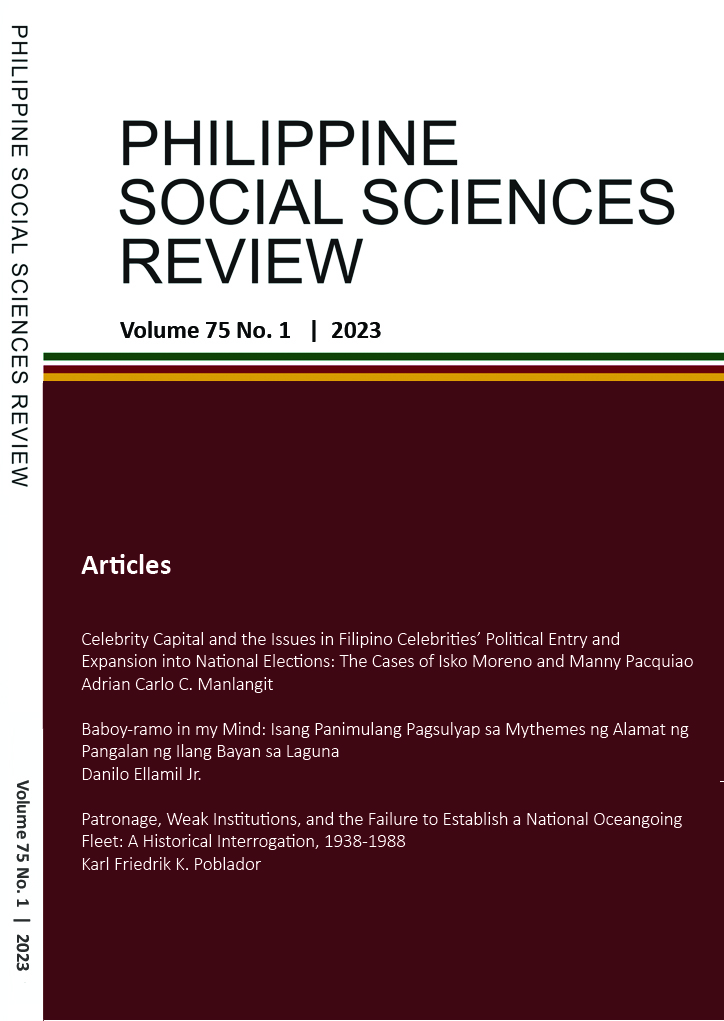
Patronage, Weak Institutions, and the Failure to Establish a National Oceangoing Fleet: A Historical Interrogation, 1938-1988
When President Corazon Aquino directed the National Development Company (NDC) to transfer its shipping assets to the National Government for eventual privatization in March 1988, the fifty-year effort of the state to participate in the development of a national merchant marine fleet effectively ended. Such an undertaking had been in place since the Commonwealth Period and was meant to make the Philippines competitive as a center for world trade and provide a revenue stream for the government. However, despite the potential of this undertaking and the support of Malacañang, sustained government participation in a national marine fleet never took hold. This paper will, therefore, show how changes in the political landscape got the Government's major stakeholder (the NDC) embroiled in a complex rent-seeking environment that prevented its shipping program from taking off despite the induced demand created by a steady rise in the volume of Philippine exports. It is a testament to how certain historical actors undermined formal institutions and effectively prevented the Philippines from developing an international fleet despite its storied past as a seafaring nation.
shipping
National Development Company
Philippine economic history
rent-seeking
cronies
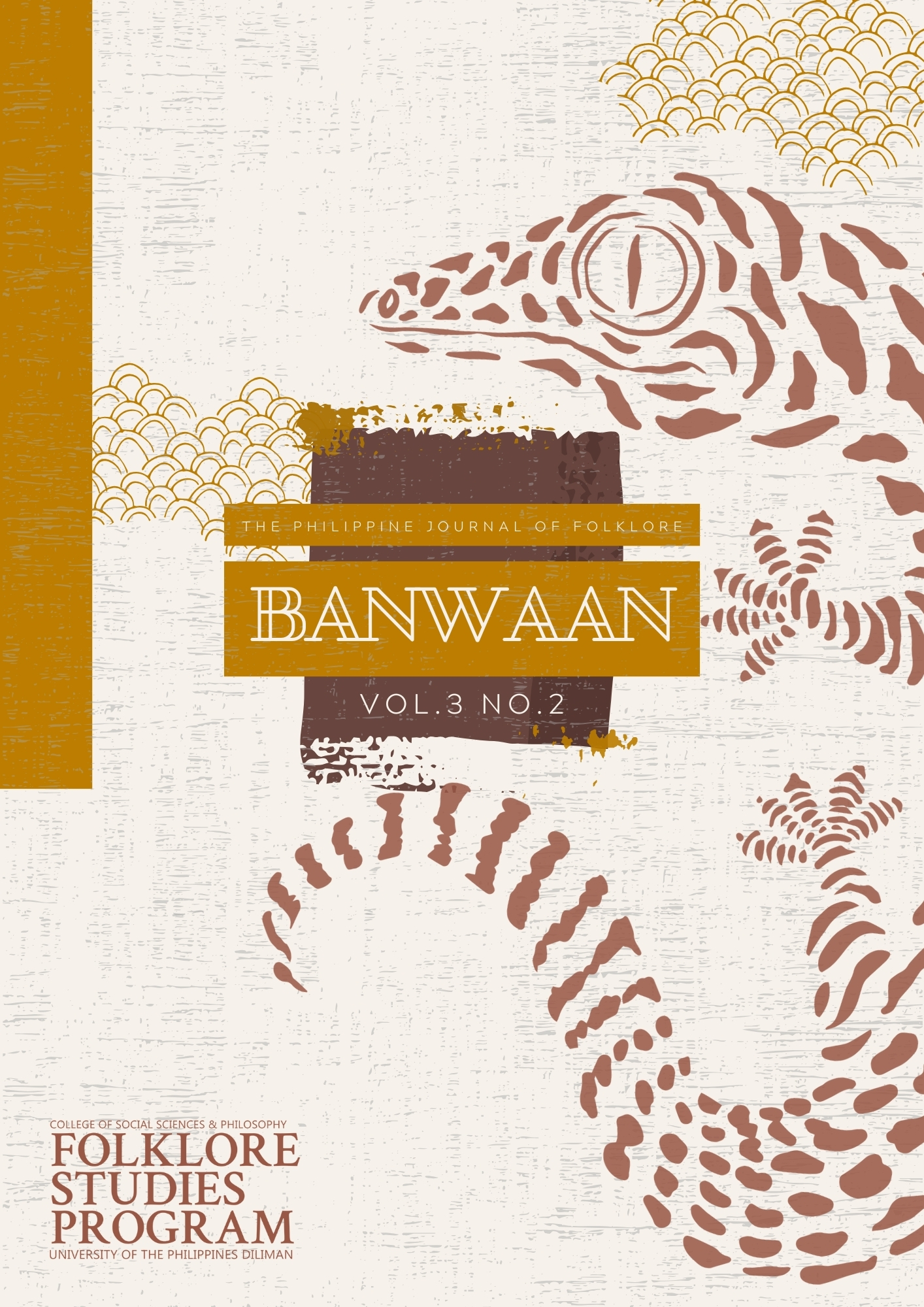
The Curse of the Tablas Strait: An Interrogation of Maritime Accidents from 1902-2008
When the M.T. Princess Empress sank off the northeast coast of Mindoro in the early morning of February 28, 2023, she became yet another addition to the list of vessels that have met their fate along the treacherous Tablas Strait. The unusually large number of disasters that have taken place in that vicinity, including one of the worst maritime tragedies in history, has created a contemporary narrative about the existence of the so-called "Romblon Triangle," which has become the watery grave of thousands of souls since the beginning of the twentieth century. While the death toll from the sinkings and collisions that have taken place in that area is irrefutable, there are logical explanations that could dispel the myth about the Tablas Strait being cursed. Hence, this article revisits official accounts of tragic events that took place in that waterway to provide analysis that could dispel the myth about the Tablas Strait being cursed. Regardless, no amount of fact-based historical accounts or even scientific analysis may be enough to dispel the mysteries and lore about this waterway, which is among the most heavily traversed in the archipelago.
interisland shipping
maritime disasters
Tablas Strait
Doña Paz
Romblon Triangle

Stars of Portent: Comets and Disasters in the Philippine Past, 1566-1910
This paper shows how the perceived relationship between comets and disasters developed and deepened among the Philippine communities through time. Lexicographic data show how indigenous Filipinos thought about comets and their passing, while ethnographic and historical accounts provide a glimpse to the knowledge processes which put into reason these cometary perceptions and predictions. Ancestral tradition, historical experience, and generations of observations can be cited as causes that established and strengthened this mentality. The arrival of Spaniards in the sixteenth century, nevertheless, made these perceptions more durable and tenacious. As shown in select historical accounts, Spanish priests and soldiers possessed the popular lore of the comet-fearing West. Gradual permeation of modern science in the nineteenth and twentieth centuries combatted these “primitive superstitions ” and “popular apprehensions” through an army of scientists, scholars, and schoolbook writers. However, comet astrology persisted among the Filipinos, as seen in print and folklore. The historical period covered is from 1566, when a comet was sighted in Cebu, to 1910, the year when the Halley’s Comet graced the Philippine sky. These comet apparitions marked not only the astronomical events but also the complementing and conflicting discourses they caused.
comet
disasters
ethnoastronomy
astrology
Philippine astronomy

Explosions et représentations : vignettes scientifiques et culturelles des éruptions du Taal
In his The Mysteries of Taal, Hargrove (1991) describes the Taal volcano as a blessing and a curse. This miscible trait of being a hazardous geological landform and the character as being a culturally significant and economically providing geographic territory symbolizes Taal volcano’s location in Philippine history and culture. This paper illustrates the aforementioned dynamic nature of the Taal Volcano. Using scientific analysis as well as cultural anecdotes in history, I attempt to describe and analyze Taal’s visualizations across time: the Taal as physical landscape that has been a subject of scientific studies, and as a cultural landscape imagined in select cultural materials. Through this approach, this study offers a way of looking at how volcanoes, as one of the potentially-loaded destructive natural landforms, tend to be read and appreciated not only as a source of hazard but also as a derivation of economic survival and intellectual production.
Taal volcano
volcanic hazards
historical eruptions
geological studies
folklores
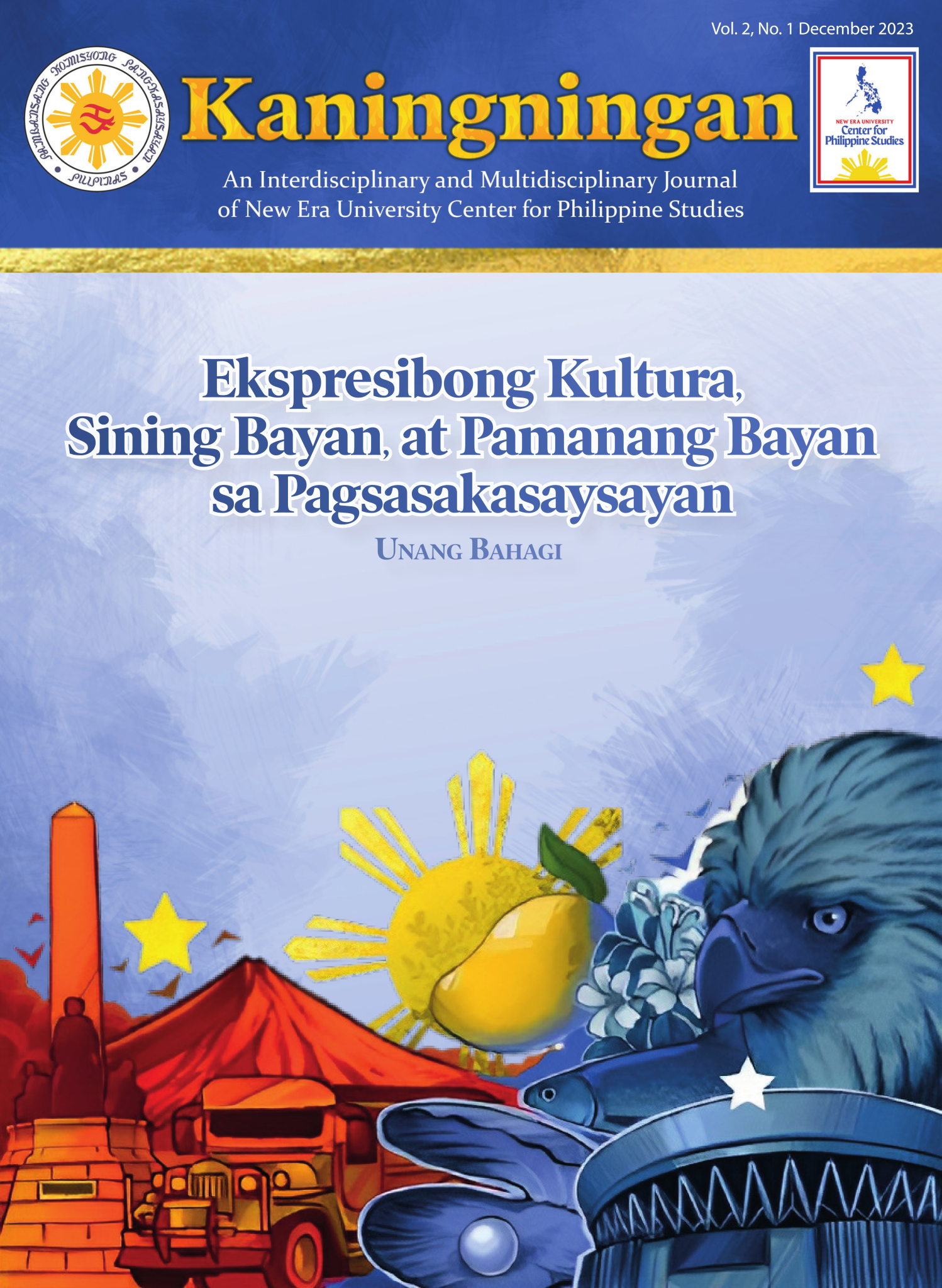
Ang Larong Sungka Bilang Pamanang Bayan sa Pananaliksik at Pagbuo ng Kaalamang Pangkasaysayan sa Pilipinas
Hindi lamang makikita ang pagiging tradisyonal na akdang pangkasaysayan sa uri ng datos na ginagamit, kundi maging sa tinutuntungang perspektiba at praxis pangkasaysayan na ginagamit ng may-akda. Ibabahagi sa papel na ito ang isang uri ng ekspresibong kultura tulad ng larong sungka bilang pamanang bayan at ekspresibong kultura. Bilang isang halimbawa ng panlipunang produksyon, ang larong sungka sa pangkalahatan ay pumapapel hindi lamang libangan ng mamamayan sa panahon ng kahupaan at kalungkutan, kundi gumagampan din ito higit sa lahat ng kapahayagang kultural at mayamang batis ng impormasyon sa pagbuo ng kaalamang pangkasaysayan sa Pilipinas.
Sa pangkalahatang sipat, tinutugunan ng pag-aaral na ito ang kakulangan ng tradisyonal na historiograpiya na sumasalok lamang ng impormasyon mula sa dokumentaryong batis sa pagbuo ng kaalamang pangkasaysayan. Sa pagsasakasaysayang Pilipino, marapat samakatuwid ang paggamit ng perspektibang pangkasaysayang nakaugat sa sariling pook- kalinangan, aplikasyon ng interdisiplinaryong lapit, paghagilap sa di-kumbensyunal na mga batis, ekplorasyon ng mga paradigm o mga modelong pangkasaysayan, at paghahabi ng naratibong pangkasaysayang sandig sa metanaratibong pangkasaysayan.
Tinitindigan ng may-akda na nakasalalay sa organiko, ingklusibo at nakasalig-sa-kalinangang uri ng historiograpiyang magsasakapangyarihan sa bayan ang nararapat na isasagawang pagtuklas hinggil sa epistemolohikal na batayan ng pagbuo ng kaalamang pangkasaysayan, ontolohikal na konsiderasyon sa pagsasakasaysayan, at pagpagpapalawak ng larang pangkasaysayang lampas sa naratibo o pagsasalaysay ng mga fact o detalye.
Sa kabuuan, bibigyang liwanag sa akdang ito ang pag-igpaw papalayo sa positibismo at interpretibismong historiograpiya para sa panloob na pagdadalumat ng kaalamang pangkasaysayang tumutugon sa simulaing pangkaunlaran sa Pilipinas. Sa pagpapaksa hinggil sa larong sungka, inaasahang ang akdang ito ay maghahatid sa atin tungo sa pagsasakatuparan ng nasabing mga layunin.
Sa pangkalahatang sipat, tinutugunan ng pag-aaral na ito ang kakulangan ng tradisyonal na historiograpiya na sumasalok lamang ng impormasyon mula sa dokumentaryong batis sa pagbuo ng kaalamang pangkasaysayan. Sa pagsasakasaysayang Pilipino, marapat samakatuwid ang paggamit ng perspektibang pangkasaysayang nakaugat sa sariling pook- kalinangan, aplikasyon ng interdisiplinaryong lapit, paghagilap sa di-kumbensyunal na mga batis, ekplorasyon ng mga paradigm o mga modelong pangkasaysayan, at paghahabi ng naratibong pangkasaysayang sandig sa metanaratibong pangkasaysayan.
Tinitindigan ng may-akda na nakasalalay sa organiko, ingklusibo at nakasalig-sa-kalinangang uri ng historiograpiyang magsasakapangyarihan sa bayan ang nararapat na isasagawang pagtuklas hinggil sa epistemolohikal na batayan ng pagbuo ng kaalamang pangkasaysayan, ontolohikal na konsiderasyon sa pagsasakasaysayan, at pagpagpapalawak ng larang pangkasaysayang lampas sa naratibo o pagsasalaysay ng mga fact o detalye.
Sa kabuuan, bibigyang liwanag sa akdang ito ang pag-igpaw papalayo sa positibismo at interpretibismong historiograpiya para sa panloob na pagdadalumat ng kaalamang pangkasaysayang tumutugon sa simulaing pangkaunlaran sa Pilipinas. Sa pagpapaksa hinggil sa larong sungka, inaasahang ang akdang ito ay maghahatid sa atin tungo sa pagsasakatuparan ng nasabing mga layunin.
Katutubong Laro
Sungka
Pamanang Kultural
Ekspresibong Kultura
Panlipunang Produksyon
| Title | Journal | Faculty Involved | Keywords | Year |
|---|---|---|---|---|
| "More Calories, More Protein, More Progress": The Nutribun and the Politics of Nostalgia of the Marcos Regime | Philippine Studies: Historical and Ethnographic Viewpoints | Francisco Jayme Paolo A. Guiang | Nutrition, Ferdinand E. Marcos, Nostalgia, International Aid, Health Communication | 2025 |
| Law Between Two Empires: Marriage and Divorce in the Evolving Philippine Legal System under the Early US colonial Period, 1898–1917 | South East Asia Research | Lorenz Timothy Barco Ranera | Legal history, marriage, divorce, Supreme Court, mixed legal system, Philippines | 2025 |
| Scientific Textualizations of Tropical Cyclones in the Philippines: The Scientific Activities of the Observatorio Meteorológico de Manila (OMM) and Philippine Weather Bureau (PWB), 1860s-1940s | History of Meteorology | Kerby C. Alvarez, Ph.D. | typhoons, Philippine Weather Bureau, Philippines, Observatorio Meteorológico de Manila, tropical cyclones | 2025 |
| From Religious to Political Ideologies: Historicizing Geopolitical Encounters and Their Impact on International Order in the Modern World | Asia-Pacific Dialogue: Advancing Cooperation in a New Era | Vicente C. Villan, Ph.D. | Historical Context, Geopolitics, Ideological Systems, International Relations, Empire Formation | 2025 |
| Colonial Integration: The Native Soldiers under Governor Sebastián Hurtado de Corcuera, 1635-1640 (Integración colonial: Los soldados indígenas bajo el gobierno de Sebastián Hurtado de Corcuera, 1635-1640) | Estudios de Historia Novohispana | Moises Levi Orlino | Sebastián Hurtado de Corcuera, native soldiers, Pampango, Tagalog, Chinese insurrection | 2025 |
| ‘Balatyagon, Huya, kag Kabalaslan’: Ang Kampanya ng mga Pilipinong Baptist tungo sa Pagsasarili at Pagsasakapangyarihan, 1922–1935 | Malay: Internasyonal na Journal sa Araling Filipino | Kristoffer R. Esquejo, Ph.D. | ABFMS, CPBC, Filipinisasyon, Iskismong Panrelihiyon, Kinagisnang Sikolohiya | 2025 |
| Recording Maladies and Remedies: Isabelo de los Reyes and Folk Medicine in Late Nineteenth Century Philippines | Banwaan: The Philippine Journal of Folklore | Joseph Adrian D. Afundar | folk medicine, El Folk-Lore Filipino, Isabelo de los Reyes, folklore, history of medicine | 2025 |
| Isabelo’s Nature and Weather: Exploring Isabelo de los Reyes’ Notes on the Physical Environment in the El Folk-Lore Filipino (1889) | Banwaan: The Philippine Journal of Folklore | Kerby C. Alvarez, Ph.D. | Isabelo de los Reyes, physical environment, folk knowledge, local history, knowledge production | 2025 |
| Authoring the Folk | Banwaan: The Philippine Journal of Folklore | Emmanuel Jayson V. Bolata | Leona Florentino, Isabelo de los Reyes, folk literature, Ilocano literature, author | 2025 |
| Legal Codification of Family-Related Filipino Proverbs (Salawikain) in the Civil Code of the Philippines, 1947-1949 | Banwaan: The Philippine Journal of Folklore | Lorenz Timothy Barco Ranera | folklore, proverbs, legal history, family law, Philippines | 2025 |
| Is Sungka a Wargame? An Investigation into Conflict and Strategy within Pre-Colonial Philippine Ludic Culture | Banwaan: The Philippine Journal of Folklore | Micah Jeiel R. Perez | sungka, folk game, wargame, warfare, strategy | 2025 |
| Juan Luna as nationalist painter and hero: examining configurations of public memory in the Philippines | South East Asia Research | Grace Liza Y. Concepcion, Ph.D. | Public memory, Philippines, Juan Luna, commemorations, paintings, museums | 2025 |
| The End of World War II in the Philippines, August-September 1945 | Journal of Philippine Local History & Heritage | Ricardo T. Jose, Ph.D. | 2024 | |
| The Role of Principalia in the Religious Life of Pueblos in Laguna in the 17th Century | Journal of Philippine Local History & Heritage | Grace Liza Y. Concepcion, Ph.D. | 2024 | |
| Saplot: Isang historiograpikong pagsipat sa pamanang pangkasuotan at modang sining ng mga Pilipino | NEU Kaningningan Journal: An Interdisciplinary and Multidisciplinary Journal of New Era University Center for Philippine Studies | Vicente C. Villan, Ph.D. | Historiograpiya, Kasuotan sa Pagsasakasaysayan, Meta-komunikasyon, Meta-mensahe, Meta-naratibo, Pagsasakasaysayang Pilipino | 2024 |
| Proto-Modern Astronomy in the Philippines: A History of Words, 10th-19th Century | The Archive | Emmanuel Jayson V. Bolata | Philippine astronomy, proto-modern astronomy, ethnoastronomy, Austronesian languages, Sanskrit, Arabic, Malay | 2024 |
| Pleasure Trail: American Land Travels to Baguio, 1900s to 1920s | The Cordillera Review: Journal of Philippine Culture and Society | Carlos Joaquin R. Tabalon | Baguio, American colonial period, travel writing, highland-lowland, mobilities | 2024 |
| A Dependent Empire: The Military Activities of the Filipino Natives in Spanish Taiwan, 1589-1642 | TALA: An Online Journal of History | Moises Levi Orlino | Spanish Taiwan, Isla Hermosa, Native Soldiers, Pampangans, Formosa | 2024 |
| Pagpapalawak ng Edukasyong Pangkagubatan sa Konteksto ng Zambales (1900-1930) | Journal of Philippine Local History and Heritage | Janet S. Reguindin-Estella, Ph.D. | Kagawaran ng Paggugubat, edukasyong pangkagubatan, siyentipikong kasanayan, administratibong pamamahala, kolonyalismong Estados Unidos | 2024 |
| Evaluating the Origins of Project Gintong Alay and Philippine Sports’ ‘Golden Years’ Under the Marcos Administration, 1978–1982 | Asian Journal of Sport History & Culture | Micah Jeiel R. Perez | Gintong Alay, Ferdinand Marcos, Michael Keon, martial law, Philippine sports | 2024 |
| Eighteenth-Century Colonial Leyte: Challenges in Administrative Jurisdiction and Tribute Collection | Journal on Philippine Local History and Heritage | Ros A. Costelo, Ph.D. | Leyte, eighteenth-century Leyte, colonial administrative jurisdiction, tribute, indigenous resistance, division of province | 2024 |
| A History of Institutional Meteorology in the Philippines, 1865-1972 | Oxford Research Encyclopedia of Climate Science | Kerby C. Alvarez, Ph.D. | Observatorio Meteorológico de Manila, Philippine Weather Bureau, meteorology, institutional meteorology, Jesuit scientists, Filipino scientists | 2024 |
| Revisiting Alzona: Internationalism in Philippine National Education (1917–1961) | Historical Bulletin | Micah Jeiel R. Perez | Encarnacion Alzona, Education, Nationalism, Internationalism | 2023 |
| Si Dante L. Ambrosio at ang Kasaysayan ng Etnoastronomiyang Pilipino, 1992–2010 (Dante L. Ambrosio and the History of Philippine Ethnoastronomy, 1992–2010) | Historical Bulletin | Emmanuel Jayson V. Bolata | Dante L. Ambrosio, etnoastronomiya, balatik, kilusang manggagawa, kapaligiran | 2023 |
| Pagsasakasaysayan ng Klima, Kalangitan, at Kalamidad: Historyograpikong Sarbey sa mga Akdang Siyentipiko at Historikal ni Miguel P. Selga, 1920s–1972 | Historical Bulletin | Kerby C. Alvarez, Ph.D. | Miguel Selga, meteorolohiya, seismolohiya, astronomiya, Philippine Weather Bureau | 2023 |
| Patronage, Weak Institutions, and the Failure to Establish a National Oceangoing Fleet: A Historical Interrogation, 1938-1988 | Philippine Social Sciences Review | Karl Friedrik K. Poblador, Ph.D. | shipping, National Development Company, Philippine economic history, rent-seeking, cronies | 2023 |
| The Curse of the Tablas Strait: An Interrogation of Maritime Accidents from 1902-2008 | Banwaan: The Philippine Journal of Folklore | Karl Friedrik K. Poblador, Ph.D. | interisland shipping, maritime disasters, Tablas Strait, Doña Paz, Romblon Triangle | 2023 |
| Stars of Portent: Comets and Disasters in the Philippine Past, 1566-1910 | Banwaan: The Philippine Journal of Folklore | Emmanuel Jayson V. Bolata | comet, disasters, ethnoastronomy, astrology, Philippine astronomy | 2023 |
| Explosions et représentations : vignettes scientifiques et culturelles des éruptions du Taal | Frontières | Kerby C. Alvarez, Ph.D. | Taal volcano, volcanic hazards, historical eruptions, geological studies, folklores | 2023 |
| Ang Larong Sungka Bilang Pamanang Bayan sa Pananaliksik at Pagbuo ng Kaalamang Pangkasaysayan sa Pilipinas | NEU Kaningningan Journal: An Interdisciplinary and Multidisciplinary Journal of New Era University Center for Philippine Studies | Vicente C. Villan, Ph.D. | Katutubong Laro, Sungka, Pamanang Kultural, Ekspresibong Kultura, Panlipunang Produksyon | 2023 |
| Dominican Missionaries and the Importation of Unwanted Chinese Children to the Philippines in the Mid-Nineteenth Century | Journal of the Society for Asian Humanities | Jely A. Galang, Ph.D. | Philippine history, Dominicans, Chinese children, Child emigration, Charity, Labour question | 2023 |
| The 1864 Sino-Spanish Treaty and the Chinese in the Philippines, 1871-1896 | Chinese Studies Journal | Jely A. Galang, Ph.D. | Sino-Spanish Treaty, Chinese, Philippine history, diplomatic history | 2023 |
| Kapaki-pakinabang na Moda ng Transportasyon? Mga Pananaw ng Diskursong Historiograpikal sa Trambiya ng Kolonyal na Kamaynilaan | HAMAKA E-Journal | Carlos Joaquin R. Tabalon | trambiya, Maynila, kolonyalismo, transportasyon | 2023 |
| An Institutional History of Nayong Pilipino Foundation, 1970-2015 | Nayon: Journal of Natural and Cultural Heritage Inaugural Issue | Patrick James B. Serra | cultural tourism, Philippine heritage, Philippine studies, theme park | 2023 |
| Writing 'La Universidad de Manila' Anew: La Solidaridad and the Revival of José María Panganiban's Campaign for Reforms in Higher Education, 1890-1891 | Bikolnon: Journal of the Ateneo de Naga | Javier Leonardo V. Rugeria | José María Panganiban, La Solidaridad, enseñanza superior (Philippine higher education), secularization, Propaganda Movement | 2023 |
| Evidence of Active Resistance against the Japanese before the Fall of Corregidor: The Case of Luzon, 1941-1942 | Journal of Philippine Local History and Heritage | Javier Leonardo V. Rugeria | Teodoro Agoncillo, Ablan-Madamba Guerrilla Forces, Tangkong Vaca Guerrilla Unit, Camp Isarog Guerrillas, Filipino-American Irregular Troops (FAIT) | 2023 |
| The First Shipping Magnates of Cebu: A History of Domestic Shipping in the Philippines. | Journal of Philippine Local History and Heritage | Karl Friedrik K. Poblador, Ph.D. | Domestic shipping, Maritime disasters, Aboitiz, William Lines, Gothong, Superferry | 2023 |
| Cultivating Knowledge: T. H. Pardo de Tavera and Philippine Medicinal Flora | The Archive | Ma. Mercedes G. Planta, Ph.D. | 2023 | |
| The 16th century Carrera del Pacífico: its sailor-merchants and their trade goods | Philippine Review of Economics | Kristyl N. Obispado, Ph.D. | Pacific trade, sailor-merchants, early globalization, Philippine-Chinese good | 2023 |
| Teksto at Talastasan: Pagmumuni at Pagbabalangkas sa Kasaysayan-bilang-Komunikasyon | Talas: Interdisiplinaryong Journal sa Edukasyong Pangkultura | Emmanuel Jayson V. Bolata | kasaysayan, komunikasyon, dialogo, may-akda, teksto, deviation | 2023 |
| Greening with Exotics: Mount Makiling and Reforestation Discourses in the Twentieth-Century Philippines | Philippine Studies: Historical and Ethnographic Viewpoints | Ruel V. Pagunsan, Ph.D. | Postwar Forestry, Forest Rehabilitation, Exotic Trees, Natural Laboratory, National Science | 2023 |
| Observing Heavens, Marking Time: The Astronomical Work of the Observatorio Meteorológico de Manila (OMM), later reorganized as the Philippine Weather Bureau (PWB), 1891-1945 | Journal of Astronomical History and Heritage | Kerby C. Alvarez, Ph.D. | Observatorio Meteorológico de Manila, Philippine Weather Bureau, astronomy, meteorology, Jesuits | 2023 |
| Ang Noumenal at ang Nominal sa Panulaan ni Allan Popa. | Daluyan: Journal ng Wikang Filipino | Emmanuel Jayson V. Bolata | 2022 | |
| Institutional Support and Crony Capitalism: The State of the Philippine Shipping Industry during the period of Authoritarian Rule | Diliman Review | Karl Friedrik K. Poblador, Ph.D. | shipping, crony capitalism, presidential decrees, IMF lending, Lusteveco | 2022 |
| Social Criticism during the Commonwealth Period: Renato Constantino and the Philippine Collegian, 1939-1940 | Diliman Review | Francisco Jayme Paolo A. Guiang | Philippine Collegian, Philippine Commonwealth, prewar Philippines, nationalism, social criticism | 2022 |
| Tracing the Provenance of Marinduque Toponyms | Social Science Diliman | Emmanuel Jayson V. Bolata | Marinduque, toponyms, placenaming, local history | 2022 |
| A Historical Seismology of Luzon Earthquakes in the 20th Century: The Dynamics of State Responses on Four Earthquake Disasters | Philippine Social Sciences Review | Kerby C. Alvarez, Ph.D. | Earthquakes, Luzon island, historical seismology, state responses, military, scientific institutions | 2022 |
| Fact-Checking ‘Fake News’ and Disinformation: Notes on Akademiya at Bayan Kontra Disimpormasyon at Dayaan’s (ABKD) Social Media Initiatives | Pingkian: Journal for Emancipatory and Anti-Imperialist Education | Francisco Jayme Paolo A. Guiang | fact-checking, fake news and disinformation, social media platforms, Marcosian disinformation, 2022 national elections | 2022 |
| Walking in UP Diliman as Ethnographic and Countermapping Practice | Banwaan: The Journal of Philippine Folklore | Emmanuel Jayson V. Bolata | walking, walk-map, autoethnography, countermapping, UP Diliman | 2022 |
| Translation of "Cayetano Sanchez Fuertes’ “Fray Juan Duarez OFM, Founder of the Town of Daraga (Philippines) | Saysay: The Journal of Bikol History | Ros A. Costelo, Ph.D. | Fr. Juan Duárez de Santa Cruz, Franciscan missions in the Philippines, , History of Camarines, Mayon Volcano, History of Daraga, History of Cagsawa | 2022 |
| Homesickness and the Filipino Nation The Emotional Experience of Propagandists, 1889–1895 | Philippine Studies: Historical and Ethnographic Viewpoints | Rhodalyn C. Wani-Obias, Ph.D. | Marcelo del Pilar, Exile, History of Emotions, Nationalism, Propaganda Movement | 2022 |
| The Philippine Army Capability Development Planning Process | The Jacinto Papers: Army Strategic Studies | Micah Jeiel R. Perez | Philippine Army, Capability Development, Capability-Based Planning, AFP Modernization Program | 2022 |
| The Philippine Army Theory of Victory | Future of Philippine Warfare | Micah Jeiel R. Perez | Philippine Army, Theory of Victory, Hybrid Threat, Hybrid Warfare, Landpower Maneuver, Capability Development | 2022 |
| The Challenges to Prohibition: Opium Law, Opium Smuggling, and Chinese in the Philippines, 1910–1935 | China and Asia: A Journal of Historical Studies | Dondy Pepito G. Ramos II | drug policy, opium smuggling, American empire, Chinese in the Philippines | 2022 |
| A Cultural Minority’s Disaster Survival Experience: The August 1968 Luzon Earthquake, the Ruby Tower Tragedy, and the Chinese in Manila | China and Asia: A Journal of Historical Studies | Kerby C. Alvarez, Ph.D. | August 2, 1968 earthquake, Ruby Tower Apartments, Chinese in Manila, disaster response, disaster memory | 2022 |
| Colonial Policies on Insanity in the Philippines, 1903-1928 | Philippine Journal of Health Research and Development | Francis Justine M. Malban | insanity, Insane Department, San Lazaro Hospital, insanity law, colonial policies, Philippines | 2022 |
| Los Chinos Macanistas: The Cantonese Chinese in the Philippines, 1778-1898 | Chinese Studies Journal | Jely A. Galang, Ph.D. | Macanista, macao, Cantonese, Chinese, Philippine history | 2022 |
| Marinduque Silencescapes: History and Stories of Local Silence | Banwaan: The Philippine Journal of Folklore | Emmanuel Jayson V. Bolata | silencescapes, Marinduque, geonarratives, local history, countermapping | 2022 |
| Science for National Development: State-Science Engagements through the Research Exploits of the National Research Council of the Philippines during the Commonwealth Period (1934-1941) | Philippine Social Sciences Review | Francisco Jayme Paolo A. Guiang | National Research Council of the Philippines, Philippine Commonwealth, national development, colonial science, state-science nexus | 2021 |
| Francisco Gaínza and the Establishment of the Escuela-Colegio de Santa Isabel: The Pursuit of Hispanization in the Diocese of Cáceres, 1863-1877 | Saysay: The Journal of Bikol History | Javier Leonardo V. Rugeria | Francisco Gaínza, Escuela-Colegio de Santa Isabel, Cáceres, Hispanization, education | 2021 |
| The COVID-19 Pandemic: Insights from Philippine History | The Journal of History | Ma. Mercedes G. Planta, Ph.D. | COVID-19 pandemic, Philippine history, smallpox, influenza pandemic, vaccination | 2021 |
| Chinese Prisoners in the Nineteenth Century Philippines | China and Asia: A Journal of Historical Studies | Jely A. Galang, Ph.D. | Chinese prisoners, Philippine history, crime, punishment, prison | 2021 |
| Deportation of “Undesirable” Chinese in the Philippines, 1837-1882. | Translocal Chinese: East Asian Perspectives | Jely A. Galang, Ph.D. | deportation, social undesirables, Chinese, Philippine history | 2021 |
| Ang Pagsusunong ng Pupuwa ng Kababaihang Gaseña | Daluyan: Journal ng Wikang Filipino | Emmanuel Jayson V. Bolata | Bearing of pupuwa, women, Gasan, Marinduque, tradition, devotion | 2021 |
| Flight and freedom: Chinese fugitives and the Spanish colonial state in the nineteenth-century Philippines | Social Science Diliman | Jely A. Galang, Ph.D. | Chinese, fugitives, flight, criminality, Philippine history | 2021 |
| José María Panganiban’s “La Universidad de Manila” and the Liberal Campaign for Reforms in Philippine Higher Education | Philippine Studies: Historical and Ethnographic Viewpoints | Javier Leonardo V. Rugeria | Jose Maria Panganiban, University of Santo Tomas, Propaganda movement, Philippine education, secularization | 2021 |
| Expulsion of “Undesirable” Chinese from the Philippines, 1883–1898 | Journal of Chinese Overseas | Jely A. Galang, Ph.D. | outcasts, expulsion, Chinese criminals, Philippines | 2021 |
| Hacienda Gomantong: The 1888 Chinese Immigration Decree, A German Tobacco Plantation, and Chinese Laborers in Jolo, Sulu, Southern Philippines | Asian Studies: Journal of Critical Perspectives on Asia | Jely A. Galang, Ph.D. | September 1888 Immigration decree, Hacienda Gomantong, Chinese in Jolo, tobacco cultivation in the Philippines | 2021 |
| Nature, Colonial Science and Nation-building in the Twentieth-Century Philippines | Journal of Southeast Asian Studies | Ruel V. Pagunsan, Ph.D. | 2021 | |
| Living Carriers in the East: Chinese Cargadores in Nineteenth-Century Manila | Philippine Studies: Historical and Ethnographic Viewpoints | Jely A. Galang, Ph.D. | Chinese, Manual Laborers, Philippine History, Nineteenth Century, Spanish Colonialism | 2021 |
| Producing “Idolatry:” Indigenous Knowledge Production via Colonial Investigations into Animism, Luzon, 1679–1687 | Philippiniana Sacra | Nicholas Michael C. Sy | Knowledge production, Missionary, Church, Philippines, Early Modern, Spanish Empire, Conversion, Idolatry | 2021 |
| Play and Propaganda: The Sports of the Ilustrados in Nineteenth-Century Europe | Philippine Studies: Historical and Ethnographic Viewpoints | Micah Jeiel R. Perez | Ilustrado, sports, nationalism, masculinity, modernity | 2020 |
| Pagkaligaw at Pamamaybay sa Elcano & Magellan (Being Lost in and Coasting Along Elcano & Magellan) | Katipunan | Emmanuel Jayson V. Bolata | Magellan, Elcano, Lapu Lapu, Samar, ligaw, baybay | 2020 |
| Gunitang Bayan at Salaysaying Bayan: Ang Pamanang Lahi sa Pag-unawa ng Kalakarang Panlipunan at Produksyong Pangkaalaman sa Pilipinas. Nasa Talas: Interdisiplinaryong Journal sa Edukasyong Pangkultura | Talas: Interdisiplinaryong Journal sa Edukasyong Pangkultura | Vicente C. Villan, Ph.D. | pamana, gunita, positibismo, kaalamang-bayan, kasaysayan | 2020 |
| The Manila Waterworks System: Water Distribution, Access, and Control in the Second Half of the Nineteenth Century | Illes i imperis | Ros A. Costelo, Ph.D. | Manila waterworks system, sanitary infrastructures, water distribution, water access, water control, colonial public works | 2020 |
| The June 1863 and the July 1881 Earthquakes: Interpretations and Responses | Illes i imperis | Kerby C. Alvarez, Ph.D. | Earthquakes, religious responses, Spanish bureaucracy, Jesuits, colonial engineers | 2020 |
| Prosecuting the “Criminals”: “Undesirable” Chinese and Court System in the Nineteenth-century Philippines | Philippine Social Science Review | Jely A. Galang, Ph.D. | Chinese, criminality, judicial apparatus, court system, Philippine history | 2019 |
| Did municipal elites intermarry? A case study of marriage practices among the political elites of San Pablo, Laguna, 1853–1854 | Philippine Studies: Historical and Ethnographic Viewpoints | Nicholas Michael C. Sy | Exogamy, Intermarriage, Colonial Historiography, Quantitative Case Study, Political Elite | 2019 |
| Tungo sa unang sentenaryo ni Bonifacio: Mga Pakikibaka at Pagpupunyagi para sa Supremo ng Katipunan, 1897–1963 | Social Science Diliman | Kristoffer R. Esquejo, Ph.D. | araling gunita, Bonifacio, Himagsikang 1896, Katipunan, Supremo | 2019 |
| Ang Dalawang Maria ng Malabon: Panata Bilang Pagsasabuhay sa mga Pagpapahalagang Pilipino sa Konteksto ng Ugnayang Pangkasaysayan at Pangkalinangan ng La Inmaculada Concepcion at La Purisima Concepcion ng Malabon | DIWA E-Journal | Kerby C. Alvarez, Ph.D. | Faith, Devotion, La Inmaculada Concepcion, La Purisima Concepcion, Virgin Mary, Malabon | 2019 |

